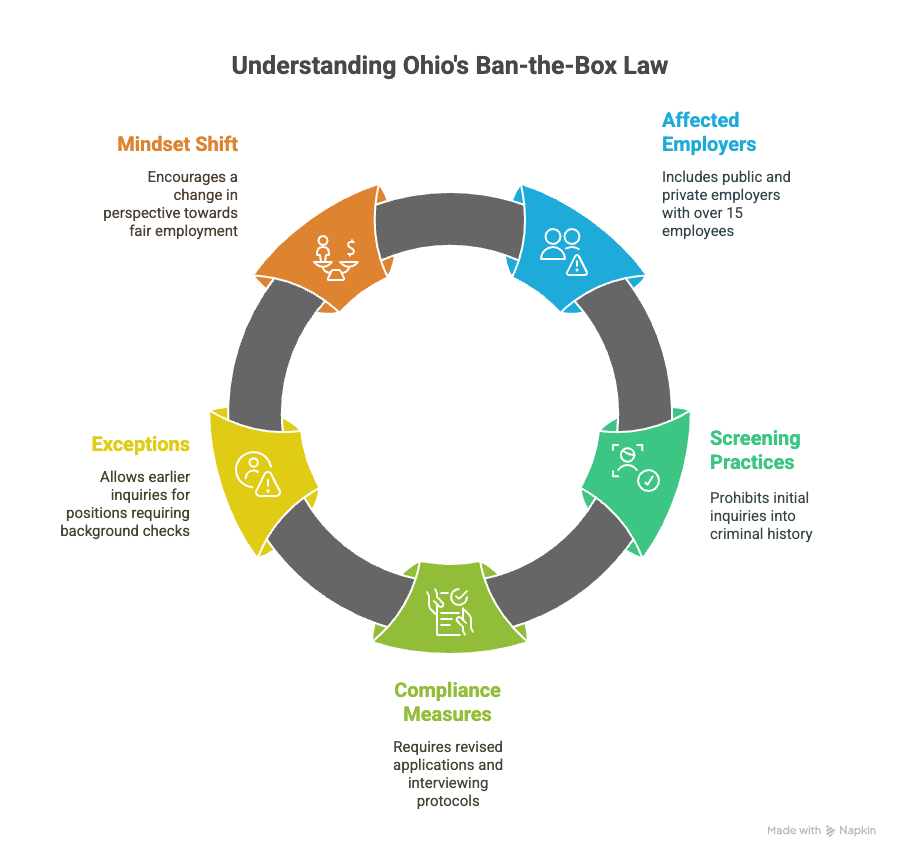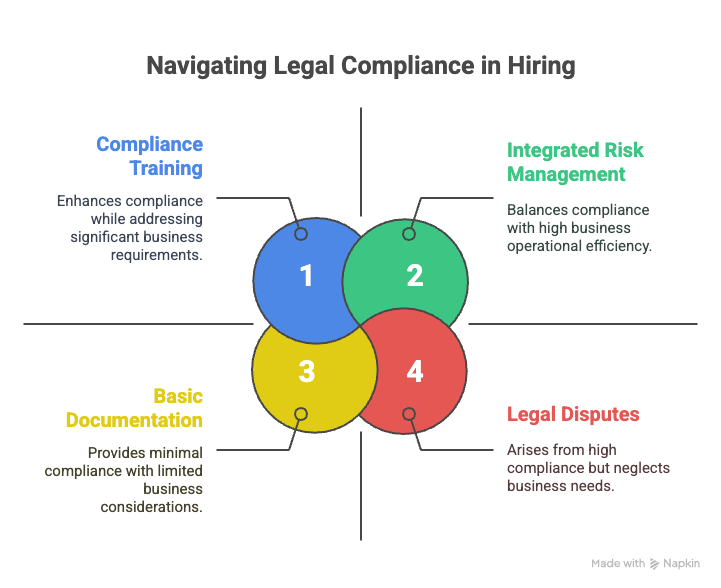Navigating the complexities of hiring legislation can be challenging, especially with nuanced laws like Ohio's Ban-the-Box. This guide unravels the essentials of Ohio Ban-the-Box compliance, offering clarity for both public and private employers. Our aim is to help you understand the law's implications, how to align your hiring practices, and ultimately, foster fairer employment opportunities across the Buckeye State.
Key Takeaways
- Ohio's Ban-the-Box law removes questions about criminal history from job applications, ensuring candidates are first evaluated based on their skills.
- Employers with over 15 employees must comply, revising hiring processes to delay criminal history inquiries until later stages in recruitment.
- Understanding exemptions is essential, especially for roles requiring security clearances that may necessitate early background checks.
- Non-compliance risks legal action, potential penalties, and reputational damage, reinforcing the importance of aligning hiring practices with the law.
- Training your HR staff and conducting regular audits can help maintain compliance, promoting a fair and inclusive hiring environment.
Introduction
Hiring decisions carry a weight of responsibility, shaping not just businesses, but lives. Understanding the Ban-the-Box movement marks a pivotal step toward more inclusive hiring practices. At its core, Ban-the-Box focuses on eliminating criminal history questions from job applications, granting a fair opportunity to all applicants right from the start.
Ohio has embraced this change through its specific Ban-the-Box law, extending across public and private sectors. The law signifies more than just compliance—it's a statement of fairness and equality in the workplace. By adopting it, Ohio aims to reduce barriers for individuals with criminal records, promoting a balanced playing field in employment opportunities.
This guide is designed to demystify the compliance journey for Ohio's Ban-the-Box law. Whether you're ensuring your practices are in line with state mandates or refining your approach to align with fair hiring initiatives, we're here to equip you with the knowledge you need. Ready to integrate these changes and champion equal opportunities? Let's get started.
What is the Ohio Ban-the-Box Law?
The Ohio Ban-the-Box law removes questions about criminal history from initial job applications. This rule is crucial for promoting fair hiring. It aims to give applicants with criminal records a fair chance at employment. Employers are required to delay questions about criminal history until later in the hiring process. This allows candidates to be evaluated based on their skills and qualifications first.
The law’s implementation began in Ohio in 2016 for public employers. Later, it expanded to include private employers. The law reflects a growing movement to reduce barriers for individuals with criminal pasts. It's part of a broader effort to improve workforce integration and reduce recidivism.
Why does this matter to you as an employer? Minimizing early-stage bias helps you focus on hiring the best candidate for the job. More fair-minded hiring practices can lead to diverse teams and a positive workplace culture. As an applicant, this law gives you a fairer platform to demonstrate your qualifications without being prematurely disqualified.
The societal impact extends beyond the workplace. Helping individuals re-enter the workforce can contribute to reducing crime rates, strengthening communities, and fostering economic growth. As you reconsider how to approach your hiring process, consider how the Ohio Ban-the-Box law may align with your company’s values and business goals. Are you prepared to make these changes? How will they impact your organization?
Key Components of Ohio's Ban-the-Box Law
Understanding who is affected by Ohio's Ban-the-Box law is crucial. The law applies to both public and private employers, but with distinctions in application. Any employer with more than 15 employees must comply, placing a significant number of organizations under its umbrella. This affects a broad range of industries, creating a statewide standard for equitable hiring practices.

The law primarily targets early-stage screening practices. It prohibits inquiries into an applicant’s criminal history on initial job applications. This means you cannot ask about past convictions during the application process. The intention is to allow candidates to be evaluated first on their qualifications, without the stigma of a criminal record.
For compliance, employers must revise their applications and interviewing protocols. You must ensure your hiring process delays questions about criminal history until later in the hiring process. This typically means after an initial interview or a conditional job offer. Consistent practice and documentation are key to compliance.
Moreover, knowing the conditions where exceptions apply is vital. Certain positions requiring state or federal background checks may mandate earlier inquiries. Be clear when such exceptions exist and ensure your HR team is aware and adequately trained.
For many, this law represents a shift in mindset about fair employment practices. How will you adjust your hiring processes to comply while maintaining effective recruitment? Answering that will help you align with both the letter and spirit of the law.
Compliance for Public Employers
Public employers in Ohio must modify their hiring processes to align with Ban-the-Box requirements. This means eliminating questions about criminal history from initial job applications. You should shift this line of inquiry to later in the hiring process, typically after an interview or conditional job offer. By doing this, you offer candidates a fair shot based on merit.
Consider what exceptions may apply. Certain public positions that require security clearances or are subject to federal regulations might still necessitate early-stage criminal background checks. Know where these exceptions fit into your hiring strategy.
Picture this: a county office looking to hire a new administrative assistant. Prior to the Ban-the-Box regulation, it might have screened out candidates with past convictions right at the start. Now, that same office must wait until a background check is truly necessary, usually after assessing the candidate's qualifications.
Being aware of these changes is step one. Implementing them correctly is the goal. Review your current procedures and see where adjustments are necessary. This approach not only ensures compliance, but also increases the diversity of your candidate pool, introducing you to applicants you might not have considered otherwise.
Compliance for Private Employers
Private employers in Ohio have specific challenges when it comes to Ban-the-Box compliance. Unlike public sector entities, private companies have varied structures, making a one-size-fits-all approach impractical. But adaptation is not just about meeting legal requirements; it’s about committing to fair hiring practices.
First, remove questions about criminal history from initial job applications. This step signals to applicants that you're focusing on qualifications first. This practice also helps prevent unconscious bias during early screening. Criminal record checks can still be part of your hiring process, but they should only occur later in the recruitment stages.
Consider integrating this law with existing fair hiring practices. For instance, focus on developing an inclusive job description that emphasizes skills and experience over background. Ensure your HR team is trained to handle applications without preconceived notions.
Here's an example scenario: Imagine you're filling a position for a security guard. The role is sensitive, but asking about criminal history upfront may deter qualified candidates. Instead, conduct thorough interviews and reference checks first. Only after identifying candidates who fit the role should you explore their background, ensuring you comply with the Fair Credit Reporting Act by notifying applicants and obtaining consent for background checks.
Remember, while compliance with Ban-the-Box is critical, it should enhance your overall hiring strategy. The aim is to foster a more inclusive workforce while still meeting your hiring standards.
Legal Considerations and Challenges
Understanding the interplay between Ohio's Ban-the-Box law and broader legal frameworks is crucial. One aspect to consider is how to mesh compliance with the Americans with Disabilities Act (ADA) and Equal Employment Opportunity Commission (EEOC) guidelines. These guidelines set out how employers can handle background checks and what questions are permissible during the hiring process. The EEOC outlines that employers should ensure that their screening processes are fair and do not result in discriminatory practices.
Balancing compliance with business needs is another hurdle. Employers must find a way to protect their interests and maintain operational efficiency while adhering to the law. Integrating Ban-the-Box regulations with routine risk management strategies is one solution. This might include revising job applications, interview processes, and perhaps most importantly, training hiring managers on compliant practices.
Disputes over compliance can arise. If an issue occurs, it's vital to have a clear process for addressing complaints or misunderstandings. Employers should document all hiring decisions and have a method for reviewing them in case of a dispute. This documentation serves as a safeguard, providing a clear trail of decision-making processes that align with the law.

In all these areas, preparation and clarity are your allies. Does your organization have the right strategies in place to handle these challenges effectively?
Impact of Non-Compliance
Failing to comply with Ohio's Ban-the-Box law can lead to multiple setbacks. Legal repercussions are at the forefront. Employers who ignore this law risk lawsuits and administrative penalties. It's more than a slap on the wrist. Legal battles can be long, costly, and drain resources that could be better spent on business growth.
Reputational damage follows closely behind. Compliance shows commitment to fairness and inclusivity. Non-compliance suggests the opposite. In today's social climate, where public perception matters, being seen as unfriendly to fair hiring can tarnish your image. Word spreads quickly, and potential employees might think twice before applying.
The financial implications can be the heaviest burden. Legal fees and fines are just the beginning. Your organization might face increased liability risks, affecting insurance costs and operational stability. By not complying, you're betting against significant financial strain.
Ohio's Ban-the-Box law aims to create a fairer hiring landscape. Ignoring it not only bypasses legal duties but undercuts societal progress. Compliance isn't just about avoiding penalties; it's about fostering a better business environment. Are you ready to shoulder the risks of non-compliance?
Best Practices for Achieving Compliance
Training and education should be your first steps. Equip your HR staff and hiring managers with solid knowledge about Ohio's Ban-the-Box law. Regular workshops can keep your team informed about any updates or changes. Effective training helps your team understand what they can and cannot do during the hiring process.
Updating policies is crucial. Revise your company’s hiring procedures to remove questions about criminal history from initial applications. Ensure this aligns with the latest legal requirements. A comprehensive policy should guide all stakeholders clearly and concisely, avoiding any ambiguities that could lead to compliance issues.
Regular reviews are a must. Implement periodic compliance audits to ensure your practices stay aligned with legal standards. These audits offer a chance to catch mistakes early and make necessary adjustments. Consistent monitoring shows your commitment to following the law and can shield your company from potential legal risks.
Have you considered whether your hiring practices reflect Ohio's Ban-the-Box requirements? Taking these best practices to heart could make a significant difference in your compliance efforts.
Conclusion
Understanding and adhering to Ohio's Ban-the-Box law is more than a checkbox in your hiring process; it's a commitment to fair employment practices. This guide has laid out the key points for compliance—removing criminal history questions from initial applications, rethinking hiring procedures, and maintaining a fair evaluation system for all applicants.
By aligning with this law, you not only protect your organization from legal pitfalls but also help build a more inclusive workforce. You play a crucial role in reducing barriers that qualified individuals face when reentering the job market, ultimately contributing to a more equitable society.
Approach this as an opportunity to refine your hiring practices, prioritize fairness, and set a standard others might follow. The rewards include a stronger, more diverse team and enhanced standing in your community. Make compliance a priority, and the benefits will ripple through your organization and beyond.
Frequently Asked Questions (FAQs)
Does Ohio Ban-the-Box apply to private companies?
No, Ohio's Ban-the-Box law does not apply to private companies. It is applicable only to public employers.
When can public employers ask about criminal history in Ohio?
Public employers in Ohio can inquire about criminal history after an initial interview or the consideration for the position.
What penalties exist for violating Ohio’s Ban-the-Box?
Ohio does not impose specific penalties for violations, but non-compliance can lead to legal challenges and potential civil rights lawsuits.
How to update job applications for Ohio compliance?
Remove any questions about criminal history from the initial job applications and delay these inquiries until after the first interview.
Do Ohio schools follow Ban-the-Box?
Yes, public schools in Ohio must follow Ban-the-Box regulations since they are public employers.
Can employers run background checks before interviews in Ohio?
Public employers cannot run background checks before the initial interview. Background checks are permitted after this stage.
Are misdemeanors included in Ohio Ban-the-Box?
Yes, the Ban-the-Box law applies to all criminal records, including misdemeanors.
How to handle disclosures after a conditional offer in Ohio?
After a conditional job offer, discuss any criminal history directly and provide context or rehabilitation evidence if needed.
Does Ohio Ban-the-Box cover gig workers?
No, the law does not cover gig workers as it applies only to public sector employment.
Can employers reject applicants for felony convictions in Ohio?
Yes, but not before an interview process has occurred and the criminal record is deemed relevant to job duties.
What should you do if your rights are violated under the Ban-the-Box law?
Contact the Ohio Civil Rights Commission for guidance and potential legal action.
How does Ban-the-Box impact job-seeking strategies?
Focus more on skills and experiences during the initial stages. Prepare to discuss your criminal history openly later in the process.
Can public employers ask about criminal history during the first interview?
No, they must wait until after the first interview is completed.
Do private contractors working with public employers have to follow Ban-the-Box?
If private contractors are hiring directly for public entities, they might be required to follow Ban-the-Box provisions.
Definitions
Ban-the-Box
Ban-the-Box refers to laws that prohibit employers from asking about an applicant’s criminal history on the initial job application. The goal is to help people with criminal records be evaluated based on their experience and skills, not past convictions. In Ohio, both public and private employers with more than 15 employees must wait until later in the hiring process—such as after an interview or conditional offer—before discussing criminal history.
Fair Hiring Practices
Fair hiring practices focus on evaluating job candidates without bias, aiming to provide equal opportunity regardless of past mistakes, race, gender, or other personal characteristics. For example, delaying background check questions allows people with records to showcase their qualifications first. Implementing these practices supports a diverse and qualified workforce.
Background Check
A background check is a review of someone’s criminal, financial, or employment history used to verify information during hiring. Under Ohio’s Ban-the-Box law, employers must wait to conduct background checks until later in the hiring process, unless the position requires clearance early on. This step helps balance safety with fairness.
Conditional Job Offer
A conditional job offer is an offer extended to a candidate that depends on passing certain checks, such as a background review or drug test. In a Ban-the-Box setting, this is the stage when it becomes appropriate to look into a candidate’s criminal history. Employers must ensure the checks are job-related and follow legal notifications and consent rules.
Compliance
Compliance means following all rules, laws, and regulations that apply to your business. For Ban-the-Box, this includes removing criminal history questions from early applications and adjusting your hiring process to meet legal standards. Staying compliant protects you from lawsuits and shows your commitment to lawful and fair hiring.
Still have questions?
Get in touch with our team today for a personalized demo and discover how our tailored volume pricing and packages can drive results for your business!
How useful was this page?*
Note: your comments are anonymous. We use them to improve the website. Do not include any personal details.
Visit our FCRA Compliance Tool or leave a message here if you need a response.
From the blog Explore the GCheck Content Hub

Massachusetts Background Check Laws: 2026 Employer Compliance Guide
27 Jan, 2026 • 16 min read
Florida Background Check Requirements: 2026 Compliance Guide
26 Jan, 2026 • 18 min read
Pennsylvania Background Check Laws: What Employers Must Know in 2026
23 Jan, 2026 • 19 min readThe information provided in this article is for general informational and educational purposes only and should not be construed as legal advice or a substitute for consultation with qualified legal counsel. While we strive to ensure accuracy, employment screening laws and regulations—including but not limited to the Fair Credit Reporting Act (FCRA), Equal Employment Opportunity Commission (EEOC) guidelines, state and local ban-the-box laws, industry-specific requirements, and other applicable federal, state, and local statutes—are subject to frequent changes, varying interpretations, and jurisdiction-specific applications that may affect their implementation in your organization. Employers and screening decision-makers are solely responsible for ensuring their background check policies, procedures, and practices comply with all applicable laws and regulations relevant to their specific industry, location, and circumstances. We strongly recommend consulting with qualified employment law attorneys and compliance professionals before making hiring, tenant screening, or other decisions based on background check information.

